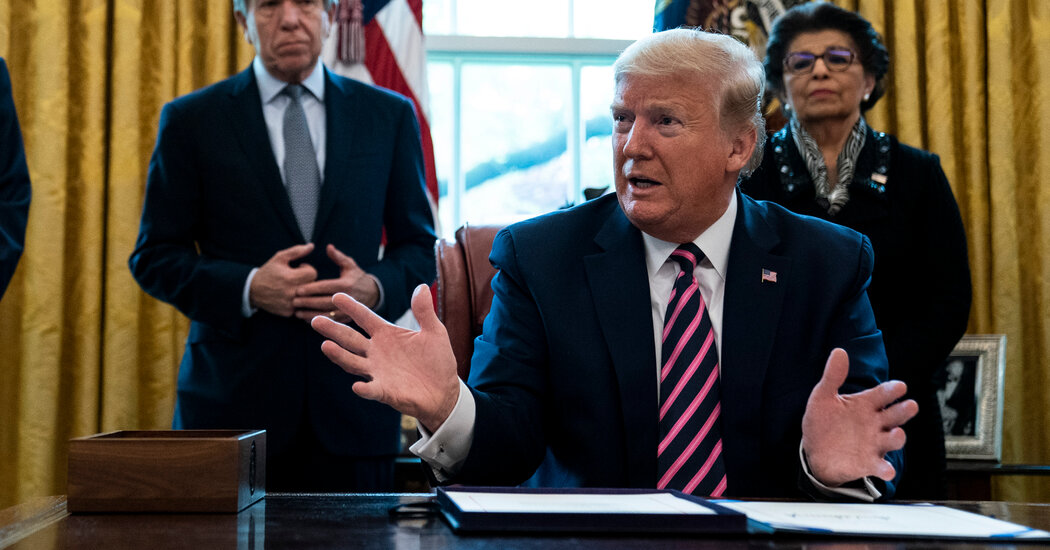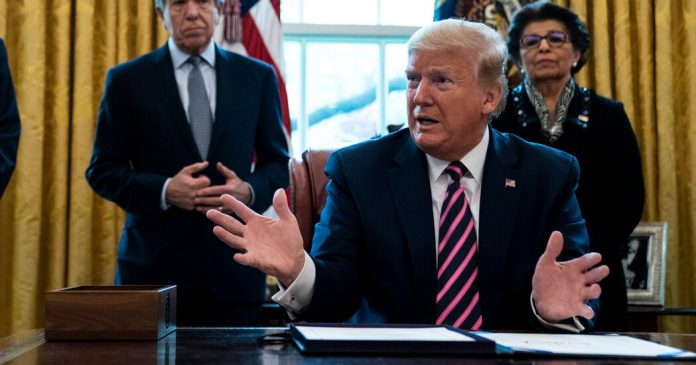
WASHINGTON — President Trump has blamed China for the coronavirus pandemic and the ensuing economic crisis, but as the White House looks to stabilize small businesses in the United States, the rescue effort has had an unintended beneficiary: Chinese companies.
Millions of dollars of American taxpayer money have flowed to China from the $660 billion Paycheck Protection Program that was created in March to be a lifeline for struggling small businesses in the United States. But because the economic relief legislation allowed American subsidiaries of foreign firms to receive the loans, a substantial chunk of the money went to America’s biggest economic rival, a new analysis shows.
According to a review of publicly available loan data by the strategy consulting firm Horizon Advisory, $192 million to $419 million has gone to more than 125 companies that Chinese entities own or invest in. Many of the loans were quite sizable; at least 32 Chinese companies received loans worth more than $1 million, with those totaling as much as $180 million.
“The extent and nature of P.R.C.-owned, -invested and -connected entities among the P.P.P. loan recipients indicate that without appropriate policy guardrails, U.S. tax dollars intended for relief, recovery and growth of the U.S. economy — and small businesses in particular — risk supporting foreign competitors, namely China,” wrote Emily de La Bruyère and Nathan Picarsic, the co-founders of Horizon Advisory, referring to the People’s Republic of China.
The revelation that Chinese-backed companies were helped by American tax dollars come as relations between the United States and China have deteriorated in recent months. Mr. Trump has regularly vented his anger at China and accused it of spreading a virus that has left the once-thriving United States economy in tatters.
“It’s China’s fault,” he said on Friday. “China should be paying for it, and maybe they will.”
The virus has emboldened the administration’s hawks in their calls for both punishing China and decoupling the world’s two largest economies, saying Beijing poses a national security threat. The administration in recent weeks has sanctioned Chinese officials accused of facilitating human rights violations in the Xinjiang region and banned more Chinese technology companies from buying American technology and components.
The White House is also nearing a decision that could force ByteDance, a Chinese firm, to sell the U.S. operations of the social media app TikTok over national security concerns.
“As far as TikTok is concerned, we’re banning them from the United States,” the president said on Friday.
But the administration’s aggressive approach to China did not stop companies with ties to Beijing from benefiting from one of the main programs intended to prop up the United States economy.
The Paycheck Protection Program, which was created as part of a $2.2 trillion relief package signed in March, was devised to help small businesses with fewer than 500 workers cover payrolls and overhead expenses while much of the economy was shuttered. When big publicly traded companies that had access to other forms of capital took out P.P.P. loans, the Trump administration publicly shamed them and Treasury Secretary Steven Mnuchin urged them to repay the money, saying they could face criminal liability if they did not qualify for the loans.
But the rules of the program also allowed American subsidiaries of foreign-owned companies to apply for and receive loans.
The Horizon Advisory report, which analyzed public filings and loan data that was released by the Treasury Department in June, does not claim to be an exhaustive account of the more than five million loans that were initiated through the program. The data released by the Treasury Department, for instance, shared loan amounts in ranges only for businesses that borrowed more than $150,000, and information for private firms that took smaller loans was released only in aggregate.
Among the companies highlighted in the report were Continental Aerospace Technologies, which received a loan of up to $10 million, and Aviage Systems, which received a loan of up to $350,000. The companies are owned by Aviation Industry Corporation of China, a state-owned conglomerate that the Department of Defense classified this year as a Chinese military company.
HNA Group North America LLC and HNA Training Center NY, subsidiaries of China’s HNA Group, both received loans of up to $1 million. HNA Group specializes in real estate, aviation and financial services transactions and is part of the Fortune Global 500.
And BGI Americas Corporation, which is a subsidiary of the Chinese gene-testing giant BGI Group, took a loan of up to $1 million. The company, which is building a gene bank in Xinjiang, did return the money, however, after Axios reported on the loan.
Larger loans went to businesses that spanned critical sectors such as pharmaceuticals, defense, advanced manufacturing, electric cars and information technology. In each case, the United States was indirectly funding the kinds of corporations whose owners the Trump administration regularly accuses of intellectual property theft.
For example, Dendreon Pharmaceuticals, a California-based biotech company, received a loan worth $5 million to $10 million. It is owned by Nanjing Xinbai, a Chinese state-invested company whose controlling shareholder has close ties to the Communist Party.
Money from the Paycheck Protection Program has also made its way to the financial technology sector. Citcon USA LLC, a Silicon Valley mobile payments firm, received $150,000 to $350,000 in loan money. ZhenFund is a major investor; the company connects American companies to Chinese payment platforms such as Alipay and WeChat, which could also face restrictions from the Trump administration.
Taken together, the loans show the deep ties that remain between American and Chinese businesses despite years of rising tension, and how the rush to prop up the United States economy inadvertently aided Chinese investors.
Lawmakers and the Trump administration are in the process of negotiating how to recalibrate the small business lending program in an upcoming economic relief package. A provision of the bill proposed last week by Senate Republicans would make businesses that are partially owned by Chinese companies or that have a Chinese resident on the board of directors ineligible for the next round of loan money. It is uncertain whether such a provision might make it to a final bill.
A Treasury spokeswoman noted that the Small Business Administration might review any of the loans administered through the program and deny forgiveness if it turned out that the borrower was not eligible or misrepresented their business in the loan application.
The White House had no comment on the loans.
The post U.S. Small Business Bailout Money Flowed to Chinese-Owned Companies appeared first on New York Times.







